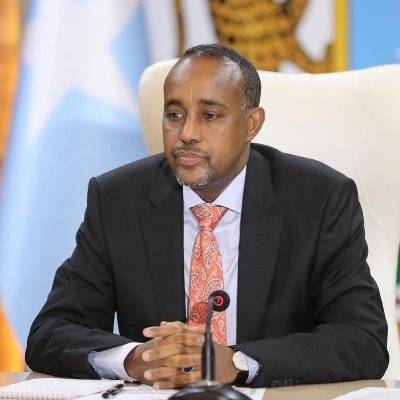Somalia allows AU troops to take charge of security ahead of elections
Somali Prime Minister Mohamed Roble said that he has authorized the African Union Transition Mission in Somalia (ATMIS) to take over the security of the hangar (tent) where the election of Lower House leadership is to take place on Wednesday.
Roble said the directive is due to security challenges on the impending elections of the speaker and two deputies of the Lower House.
“In light of the severity of the security challenges impeding the completion of the elections, I have authorized ATMIS peacekeepers to immediately take over the security of the air force hangar as we complete the election of parliamentary leadership and prepare for the presidential election next month,” he said in a statement issued in Mogadishu, the capital of Somalia.
Key events are being held under tight security measures in a hangar belonging to the Somali Air Force at Mogadishu’s international airport.
Roble said the ATMIS leadership will closely coordinate with the prime minister’s office, ministries of security and defense as well as parliamentary leadership to ensure peaceful elections.
He said the list of lawmakers to access the hangar will be prepared by the interim Speaker of the Lower House, compiled by the prime minister’s office and sent to ATMIS leadership accordingly.
The election of the speaker of the Upper House or the Senate was held Tuesday and analysts say the election of the Lower House could give direction in regard to who among the candidates is likely to win the presidential elections in May.
The 54-member Senate and the 275 members of parliament from the Lower House are expected to jointly elect a new president in an indirect vote in Mogadishu but no date has been set so far.
Senate Speaker
Somalia’s Upper House of Parliament or Senate on Tuesday reelected Abdi Hashi Abdullahi as the speaker during polling held in Mogadishu, the capital of Somalia.
Somalia’s Lower House of Parliament is expected to elect a speaker and two deputies Wednesday. Both Houses of Parliament are expected to set a date for the presidential election soon.
The elections were held in the wake of rising security threats in Mogadishu, which threatened to paralyze the exercise.
Threat of Famine
– United Nations partners are taking a different approach to famine prevention in Somalia: focusing on collaboration with local authorities and communities in at-risk areas, UN humanitarians said.
“In 2016/2017, a similar shift coupled with timely and scaled up humanitarian assistance averted famine in Somalia,” the UN Office for the Coordination of Humanitarian Affairs (OCHA) said.
“As the drought in Somalia continues to deteriorate the country faces the risk of famine in six areas through June 2022 if the April to June ‘Gu’ season rains fail as forecast, food prices continue to rise, and humanitarian assistance is not scaled up,” the office said. The number of people affected by extreme drought is up from 4.9 million in March to 6.1 million in April. The search for water, food and pasture displaced about 759,400 people.
The Ukraine conflict helps hike food prices.
The office said that up to 90 percent of the water sources across Somalia are drying up, including the Shabelle and Juba rivers. Water levels are below historic minimum levels. An estimated 3.5 million people lack sufficient access to water.
Hunger is rising, with more than 6 million Somalis now facing severe food shortages from April through mid-2022, with an Integrated Food Security Phase Classification (IPC) of 3 or higher, OCHA said. Acute malnutrition in children is on the rise, reaching catastrophic levels in some districts in southern Somalia.
It said that some 1.4 million children face acute malnutrition this year, and 45 out of 74 districts have global acute malnutrition rates of above 15 percent.
Lack of access to timely and adequate health care and insufficient access to clean water, food and nutrition have contributed to a spike in preventable diseases, OCHA said. Since January, authorities confirmed more than 3,675 cases of acute watery diarrhea/cholera and 2,720 cases of measles, increasing new admissions.
The office said drought disrupted school attendance for 1.4 million children in Somalia, of whom 420,000 are at risk of dropping out. About 45 percent of the students are girls. Since January, humanitarian partners have reached almost 2.6 million people in Somalia with lifesaving assistance, including cash assistance and vouchers, OCHA said. The 2022 Humanitarian Response Plan has received only 66.7 million U.S. dollars of the 1.5 billion dollars required. That’s only 4.6 percent.
It said the UN Central Emergency Response Fund (CERF) allocated 14 million U.S. dollars for the Somalia response, and the Somalia Humanitarian Fund allocated 20 million dollars. The funding brings total CERF funding for the drought response in Somalia to 66 million dollars since early 2021.
The OCHA said the drought risks becoming one of the worst climate-induced emergencies in the Horn of Africa’s recent history. “This is one of the most severe La Nina-induced droughts in recent memory in the Horn of Africa, leaving 15-16 million people across the Horn of Africa facing high levels of acute hunger.”
Last week, the UN World Meteorological Organization said, “Eastern Africa is facing the very real prospect that the rains will fail for a fourth consecutive season, placing Ethiopia, Kenya, and Somalia into a drought of a length not experienced in the last 40 years.”

Leave a Reply